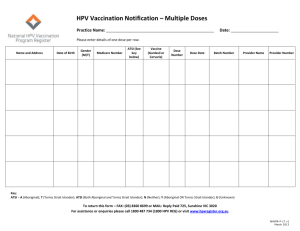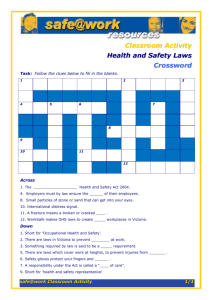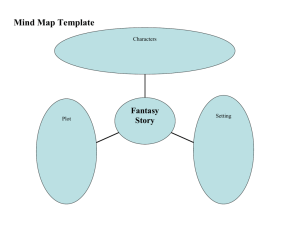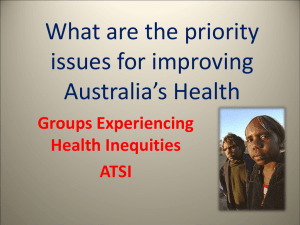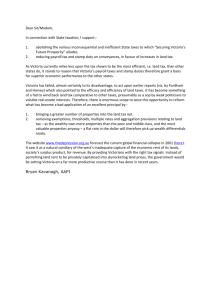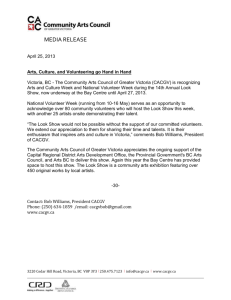Word
advertisement
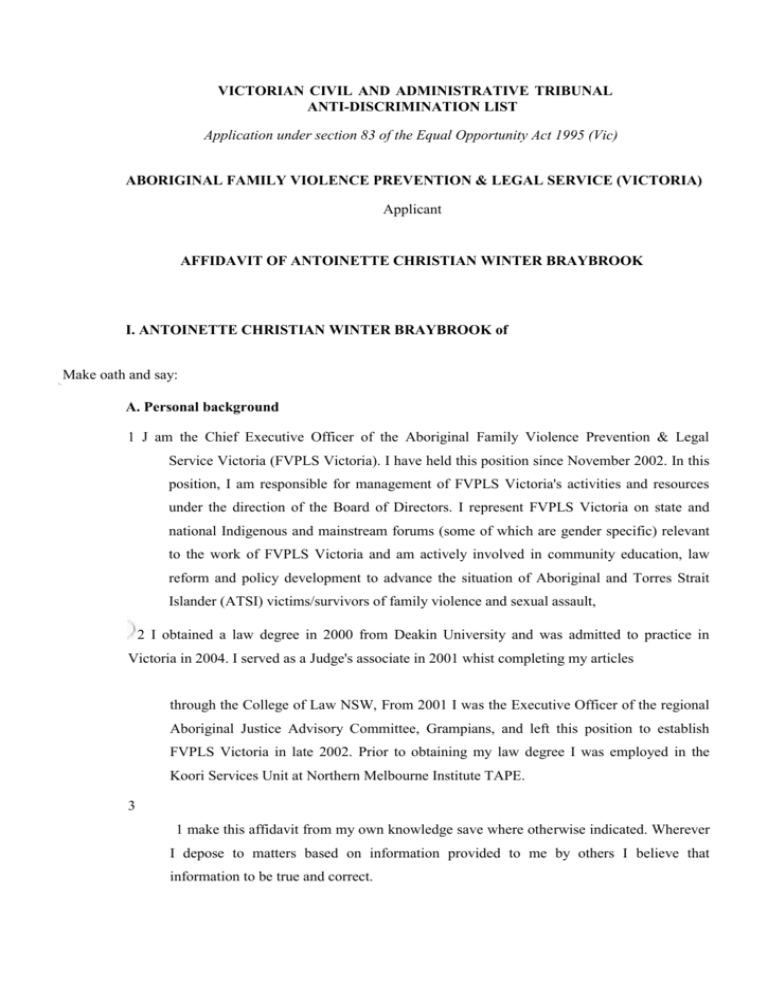
VICTORIAN CIVIL AND ADMINISTRATIVE TRIBUNAL
ANTI-DISCRIMINATION LIST
Application under section 83 of the Equal Opportunity Act 1995 (Vic)
ABORIGINAL FAMILY VIOLENCE PREVENTION & LEGAL SERVICE (VICTORIA)
Applicant
AFFIDAVIT OF ANTOINETTE CHRISTIAN WINTER BRAYBROOK
I. ANTOINETTE CHRISTIAN WINTER BRAYBROOK of
Make oath and say:
'•-,
A. Personal background
1 J am the Chief Executive Officer of the Aboriginal Family Violence Prevention & Legal
Service Victoria (FVPLS Victoria). I have held this position since November 2002. In this
position, I am responsible for management of FVPLS Victoria's activities and resources
under the direction of the Board of Directors. I represent FVPLS Victoria on state and
national Indigenous and mainstream forums (some of which are gender specific) relevant
to the work of FVPLS Victoria and am actively involved in community education, law
reform and policy development to advance the situation of Aboriginal and Torres Strait
Islander (ATSI) victims/survivors of family violence and sexual assault,
2 I obtained a law degree in 2000 from Deakin University and was admitted to practice in
Victoria in 2004. I served as a Judge's associate in 2001 whist completing my articles
through the College of Law NSW, From 2001 I was the Executive Officer of the regional
Aboriginal Justice Advisory Committee, Grampians, and left this position to establish
FVPLS Victoria in late 2002. Prior to obtaining my law degree I was employed in the
Koori Services Unit at Northern Melbourne Institute TAPE.
3
1 make this affidavit from my own knowledge save where otherwise indicated. Wherever
I depose to matters based on information provided to me by others I believe that
information to be true and correct.
43.101 Collins Street MELBOURNE VIC
3000
\4236551
DX: 240 Melbourne Tel. 039288 1234
Fax 03 9288 1567 Ref. Lisa Croxford
page 1
Filed on behalf of the Applicant,
FVPLS by: Freehills Level
^
B.
4
5
6
7
8
9
C.
8
G
,
3
2
Background to FVPLS
FVPLS Victoria was incorporated in October 2002. It is an ATSI community controlled
organisation based in Melbourne that also provides outreach services to regional Victoria.
FVPLS Victoria is responsive to the diverse and unique needs of Victorian ATSI
Communities.
FVPLS Victoria was established as part of the National Family Violence Prevention and
Legal Services Program. The Aboriginal & Torres Strait Islander Services (ATS1S) (an
Executive Agency of the Commonwealth Government appointed to administer programs
which were previously the responsibility of ATSIC) initially funded 13 Family Violence
Prevention Legal Services to provide 'services to victims of family violence and sexual
assault and where appropriate to work with the families and communities affected by it'.
Recognition of a lack of dedicated services for ATSI victims/survivors of family violence
and sexual assault was a significant factor in the establishment of the FVPLS program.
Experts in the field have identified that ATSI victims/survivors of family violence are
reluctant to access other available A'l'SI legal services. This is partly due to conflicts of
interest which may arise as a result of the significant criminal defence practices of other
services. ATSI women and children are also reluctant to approach and speak with the other,
typically male dominated, ATSI legal services.
Management of the FVPLS funding program has now transferred to the Commonwealth
Attorney-General's Department and 31 FVPLS units have been established across Australia.
As well as funding from the Commonwealth Attorney-General's Department through the
FVPLS program, FVPLS Victoria also receives funding from a number of other sources
including Victoria Legal Aid, Department of Justice Victoria and other project grants.
FVPLS Victoria has received endorsement from the Australian Tax Office as a deductible
gift recipient under sub-division 30-BA of the Income Tax Assessment Act 1997 on the basis
that FVPLS Victoria is a public benevolent institution.
Principles and objectives of FVPLS
The following is extracted from the FVPLS Victoria constitution.
The objects of the
3
(!)
are:
Association
(a)
to provide assistance to victims of family violence:
Benefits to members of the public
As there is no dedicated legal service for ATSI women in Victoria as in some other
states,
FVPLS Victoria must take a leading role in supporting and improving the safety of ATSI
women and children who are, in any event, our predominant client group. We know that
ATSI women
are reluctant to access mainstream legal services.
Damaging
experienc
es
with the justice system and authority as a result of systemic racism and discrimination
have
wom
been
en
particularly disadvantaged by a lack of dedicated legal and support services and whilst
some progress is being made, there is a significant way to go. Family violence and sexual
continues to impact upon the ATSI community. In addition, ATSI
a
r
e
women and
required to address past failures to pay attention to the plight of ATSI
to
ensure the best possible services are available to improve their safety and well being.
assault
3
3
I
rat
es
refe
to
r
again
st
th
e
AT
SI
concludin
g
wome
n
an
d
comment
s
children
remain
o
f
th
e
high.
Special
Committe
e
o
n
measur
es
th
e
Eliminatio
n
Discrimination against Women for Australia in 2006. At paragraph 31 the
recommends
'targete
measure
including temporary
measures...t
o
f
Committ
ee
improv
W236551
(b) to reduce the
incidence of violence
and abuse in
communities through
community education
and advocacy;
(c) to increase the
recognition of the
problem of violence
and abuse in
communities through
community education
and advocacy; and
(d) to facilitate
long-term solutions to
violence and abuse in
communities,
(e) operate and
maintain a Gift Fund
entitled "Aboriginal
and Torres Strait
Islander Corporation
Family Violence
Prevention and Legal
Service (Victoria)" in
accordance with
requirements of the
Australia Taxation
Office.
communities free from family
violence;
(c) promoting awareness,
understanding and
acknowledgment of the issues
of family violence;
(d) providing legal advice,
representation, referral and
other related support services
to Aboriginal and Torres Strait
Islander victims of family
violence;
(e) coordinating with, seeking
to improve the accessibility of,
and increasing the
effectiveness of, other legal
and related support services
working to assist Aboriginal
and Torres Strait Islander
victims of family violence;
(I) liaising and coordinating
with key agencies, including
State and Federal bodies, to
ensure the availability of
culturally appropriate service
provision to Aboriginal and
Torres Strait /slander victims
of family violence; and
\4236551
3
(2)
The
Association will
seek to advance
these objects by:
(a) addressing the
causal effects of family
violence and the
extreme disadvantage
of Aboriginal and
Torres Strait Islander
People;
(b) working towards
the elimination of
family violence and the
effects of family
violence in the lives of
Aboriginal and Torres
Strait Islander People
and to particularly
empower Aboriginal
and Torres Strait
Islander People to live
infamilies and
Cg) promoting and undertaking community education and awareness initiatives,
ami relevant research.
D. Services
9 Through offices in Melbourne, Bairnsdale, Warraambool and Mildura, FVPLS Victoria engages in
legal assistance, counselling, information and referral, community legal education, policy
development and law reform for Indigenous victims/survivors of family violence and sexual
assault and for non-ATSI carers of ATSI children. In accordance with national FVPLS
operational guidelines the service does not assist perpetrators.
10 The vast majority of clients of FVPLS Victoria are women and children. The number of clients
seeking assistance in 2008-09 from FVPLS Victoria totalled 263 women, 25 men and 12 children.
In the six months to 31 December 2009, the total was 187 women, 14 men and 8 children.
11 FVPLS has a number of clearly defined service delivery priorities under the National Family Violence
Prevention Legal Services Program Operational Framework 2009. These are as follows:
» Provide a safe, culturally sensitive environment
•
Legal assistance, advice, casework and court support
•
Information, support and referral
•
•
•
Counselling
• Sexual assault services Child protection j
Community promotion
12 The Family Violence Prevention Legal Services Policy Manual also guides service provision. The
following is included in relation to accessibility and cultural accessibility:
All policies, procedures, training and recruitment will reflect the organisation's commitment to
provide an accessible and culturally sensitive service. This will include helping, where possible,
to address any barriers to accessing services, such as language, remoteness and cultural
background.
W236551
Dl. Legal services
13
Legal assistance is provided through employment of lawyers and paralegal support
workers in the areas of family violence law, family law, child protection and victim's
assistance in accordance with operational guidelines.
14
The Victorian Aboriginal Legal Service is the other ATST legal service in Victoria. The
Aboriginal and Torres Strait Islander Legal Services ('ATSILS') funded across Australia
have had a significant focus on criminal defence work.
15 Whilst VALS and the other ATSILS also provide civil and family !aw services, conflicts of
interest arise in family violence and sexual assault cases as a result of the significant
criminal defence practices of these services.
~"\ 16 The independence of FVPLS Victoria as an organisation dedicated to supporting ATS1
victims/survivors has been a key factor in gaining the trust of ATSI women and encouraged
them to seek legal and associated supports for themselves and their children. I believe that
FVPLS Victoria has contributed to the safety of ATSI women and children in the state
since its commencement. There is no ATSI women's specific legal service in Victoria at the
present time, however as detailed, the vast majority of FVPLS Victoria clients are women
and children.
D2. Community programs
1 7 The Sisters Day Out program and Sisters Serenity Retreats developed by FVPLS Victoria are
currently the primary community education and community development projects
undertaken by the service. As at 31 December 2009, approximately 2000 women across
....
Victoria have participated in 36 workshops and 74 women attended four camps which
involve wellbeing and pampering as well provision of community legal education, and
access to legal advice. The cultural aspects of the Sisters Day Out workshops, and
involvement of elders, are integral to strengthening the role Koori women have in relation
to family and community. The workshops build on self-esteem and identity, which
reinforce women's entitlement to feel safe and secure in their roles as nurturers and leaders
in the community.
18
FVPLS Victoria through its broader community engagement also provides education and
guidance to the non Indigenous community. FVPLS Victoria has in the past and will again
this year engage in cultural awareness workshops for mainstream agencies and individuals
working with our service and our client group. Two ATSI women with
\4236551
expertise in cultural awareness training are engaged by FVPLS Victoria to carry out this work.
19 FVPLS Victoria seeks to ensure ongoing law reform and policy development capacity. although
the service is not currently funded by government for this activity. Many of the reference
groups and committees relevant to this work are open to ATSI participants only. Mainstream
service providers regularly seek FVPLS Victoria input in relation to cultural and ATSI
accessibility issues. In the 2008-09 financial year, FVPLS Victoria had representation on a
range of committees. These include but are not limited to:
•
Department of Planning and Community Development Statewide Advisory Committee to Prevent
Sexual Assault
•
Federation of Community Legal Centres Violence Against Women &
•
Flat Out - Post Release support service for Women and their children
•
Law Institute of Victoria Children and Youth Issues Committee
•
North- West Melbourne Regional Aboriginal Justice Advisory Committee
•
"Ngwala Willumbong Board of Directors . Northern Melbourne Institute of TAFE Council
•
Victorian Indigenous Family Violence Partnerships Forum . Victorian Aboriginal Justice Forum
D3. Partnerships and Links
20 The FVPLS Victoria annual report 2008-09 lists the organisations with which FVPLS
-
Victoria has established links and the committees and working groups the organisation is
represented on in both metropolitan and regional areas. The following are a selection of key
involvements and partnerships:
•
Victorian Aboriginal Justice Forum
•
Regional Aboriginal Justice Advisory Committees (Melbourne, Grampians, Barwon South West,
Loddon Mallec and Gippsland)
•
Ngwala Willumbong (Drug and Alcohol Services) Board of Directors
•
Elizabeth Hoffman House Aboriginal Women's Refuge
\4236551
•
Winja Ulpna - Aboriginal Women's Alcohol and Drug Recovery Centre
•
Women's Domestic Violence Crisis Service . Dhauwurd-Wurrung Elderly and Community Health
Service . Gunditjmara Aboriginal Co-operative
•
Margaret Tucker Aboriginal Hostel
•
Wanjana Lidj Family Preservation Program Morwell
•
Ramahyuck District Aboriginal Corporation
•
Regional Indigenous Family Violence Workers CASA House
•
Sisters Inside Queensland
•
Flat Out - Post Release Support for Women and Children
•
Victims Support Agency
•
• Federation of Community Legal Centres In addition to the Sisters Day Out workshops and Sisters
Serenity Retreats detailed above the following are other significant projects currently being undertaken by
FVPLS Victoria:
•
(Coori police protocols project - developing and trialling Koori specific police family violence
protocols with three communities - North West Melbourne, Bairnsdale and Mildura, FVPLS Victoria is
hopeful that the project will be rolled out across the state.
. Legal Services Board funded 10 month policy development/law reform project looking at strengthening
service delivery, extending the Commonwealth FVPLS funding program to urban areas and
addressing barriers to ATSI[sicj in the legal system relevant to FVPLS Victoria client group.
Ongoing funding to ensure continuing policy development law reform capacity within the
organisation is being sought.
Legal Services major grant - to re-establish an urban presence for the FVPLS program through
funding for a solicitor, paralegal support worker and counselling services for a 12 month period.
Government funding to continue this program is
W236551
sought. In recognition of the vast overrepresentation of ATSI children in the
child protection system in Victoria the focus of the legal position will be child
protection law and a submission for a child protection policy project has also been
made.
. Community education workshops across Victoria relating to the new family violence laws
and child protection.
E. Staff EL Current
staff
?2 FVPLS Victoria currently employs 24 full-time and pan-time staff, all female, including eight
Aboriginal employees. Position descriptions includes the following as a key selection
criterion for all positions:
>s
A demonstrated knowledge and understanding of ATSI societies and cultures and the
issues affecting these societies or a willingness to gain such awareness.
A demonstrated ability to communicate effectively with and gain the confidence of
Aboriginal and Torres Strait Islander people, particularly women, in areas of extreme
personal and cultural sensitivity.
For most other positions, the following is stipulated as an additional key selection criterion:
Demonstrated awareness of the issues affecting ATSI people including family
violence, sexual assault, family law, and care and protection of children.
E2. Why the positions are best performed by ATSI women
The position of CEO of FVPLS Victoria would be best performed by an ATSI woman for
reasons of trust and respect within the ATSI community. The CEO, with the Board leads the
organisation in all of its activities and issues of culture are fundamental. Non ATSI staff
defer to the CEO on all cultural issues. Given that the vast majority of FVPLS Victoria
clients are ATSI women and children and that many women make initial contact directly
with the CEO for assistance and referral it is also fundamental to the effectiveness of the
service that the CEO is a woman. It is my belief that if the CEO was a male, ATSI women
would not access the service and other women's services would be less open to engagement
on sensitive women's issues. It would be difficult for a male
.,,-•
W23G551
CEO to successfully engage with the women's services with which FVPLS Victoria has partnerships.
24 ATSI women are unlikely to fully disclose detail about violence and/or sexual assaults against them by men
to male solicitors. FVPLS Victoria must have female solicitors employed to ensure that women feel
comfortable to disclose these crimes against them. Often the nature of the legal process means that the
offending needs to be described in some detail and the outcome of some cases relies on this full
disclosure. It is relevant that most perpetrators are male and that for some women, particularly where
the crime against them is recent, working closely with a male may further traumatise them and
certainly inhibit comfort and disclosure. Organisations referring women who are victims/survivors of
family violence or sexual assault will give women choices as to referral. Referrals are far less likely to
an organisation where assistance from a female solicitor is not available.
25 ATSI solicitors will have understanding of community and family dynamics and in the area of family
violence law would be in a position to talk these important issues through with clients as an integral
part of the legal advice given. ATSI solicitors would also be in a position to provide cultural expertise
in relation to policy development and law reform activity and gain ATSI and mainstream community
respect and support for proposed change.
26 Paralegal support workers work very closely with lawyers and often are the support people in legal
interviews and during court proceedings. Women victims/survivors will be best supported by women in
these roles. Paralegal support workers may be involved with other aspects of the client's life such as
health, housing and counselling referrals. Many of these referrals will be to women's organisations and
will involve issues of gender and cultural sensitivity.
27 FVPLS Victoria receives funding for counselling which is currently outsourced. Clients are given choices
about the gender of counsellors and it is my understanding through feedback from FVPLS Victoria
staff that women counsellors are preferred. Should FVPLS Victoria move to a position of again
employing in house counsellors/psychologists at least one of those counsellors would need to be a
woman to ensure our client group accessed these support services. Solicitors often refer clients to
counsellors to assist in documenting crimes against them including assaults and sexual assaults. It is
noted that the Victoria police SOCAU units have female staff available to
W236551 f ,.-'7*
'"
^
receive reports and take statements from women victims of these crimes for these same
reasons.
28 Community education and community development positions require good communication with
and knowledge of community. ATS I workers in these positions would be best placed to
determine culturally appropriate means of delivering information as well as ensuring that the
content is respectful of culture. Trust is also a key factor in community engagement.
29 Policy development and law reform positions require ATSI input as much of the work relates to the needs
of ATSI clients and issues of ATSI accessibility and cultural sensitivity. As previously mentioned,
some key reference groups relating to policy development are open only to ATSI representatives or
ATSI women and unless an ATSI woman is employed FVPLS Victoria is excluded from participation.
It is also the case i
•_*>»*
that mainstream committees working in these areas regularly seek input on ATSI cultural
issues.
F. Benefits to clients
30 The fact that direct contact is often first made with the FVPLS Victoria CEO by ATSI women
seeking legal assistance indicates that she has an ATSI woman is trusted to provide
information and make referral. Other referrals come from ATSI workers at Elizabeth
Hoffman House, the Aboriginal women's refuge, where initial contact has been made. This
demonstrates that access to services through ATSI staff and networks is the most common
and most effective means for ATSI victims/survivors to gain assistance. In addition the
Sisters Day Out and Sisters Serenity Retreats have received an
••~T-i
overwhelming response from community. They are run by respected ATSI women
contracted by FVPSL Victoria with assistance from FVPLS Victoria CEO and the ATSI
community education worker. Women have attended in huge numbers and have also opened
up about personal issues at these events. I believe that this is attributable to the facilitation
and development of these events by ATSI women with great community respect, networks
and experience in their field.
31 It is difficult to locate ATSI counsellors/psychologists and our outsourced counsellors are
currently non - ATSI. FVPLS Victoria is aware that some clients have found the mainstream
counselling model unhelpful. It is also a concern to FVPLS Victoria that non ATSI
counsellors/psychologists may lack cultural sensitivity and understanding. Many
W236551
clients, in addition to current difficulties, remain traumatised by the impact of a history of racist and
discriminatory mistreatment and abuse. FVPLS Victoria in 2009 seeks to focus upon development of the
counselling program to ensure it is culturally accessible and involves alternative ATS1 healing options. This
project will be best informed by an ATSI worker.
B.
Sworn 4
at: ) In
the
5
State
of
6
7
8
9
C.
8
G
,
3
2
Background to FVPLS
FVPLS Victoria was incorporated in October 2002. It is an ATSI community controlled
organisation based in Melbourne that also provides outreach services to regional Victoria.
FVPLS Victoria is responsive to the diverse and unique needs of Victorian ATSI
Communities.
FVPLS Victoria was established as part of the National Family Violence Prevention and
Legal Services Program. The Aboriginal & Torres Strait Islander Services (ATS1S) (an
Executive Agency of the Commonwealth Government appointed to administer programs
which were previously the responsibility of ATSIC) initially funded 13 Family Violence
Prevention Legal Services to provide 'services to victims of family violence and sexual
assault and where appropriate to work with the families and communities affected by it'.
Recognition of a lack of dedicated services for ATSI victims/survivors of family violence
and sexual assault was a significant factor in the establishment of the FVPLS program.
Experts in the field have identified that ATSI victims/survivors of family violence are
reluctant to access other available A'l'SI legal services. This is partly due to conflicts of
interest which may arise as a result of the significant criminal defence practices of other
services. ATSI women and children are also reluctant to approach and speak with the other,
typically male dominated, ATSI legal services.
Management of the FVPLS funding program has now transferred to the Commonwealth
Attorney-General's Department and 31 FVPLS units have been established across Australia.
As well as funding from the Commonwealth Attorney-General's Department through the
FVPLS program, FVPLS Victoria also receives funding from a number of other sources
including Victoria Legal Aid, Department of Justice Victoria and other project grants.
FVPLS Victoria has received endorsement from the Australian Tax Office as a deductible
gift recipient under sub-division 30-BA of the Income Tax Assessment Act 1997 on the basis
that FVPLS Victoria is a public benevolent institution.
Principles and objectives of FVPLS
The following is extracted from the FVPLS Victoria constitution.
The objects of the
3
(!)
are:
Association
(a)
to provide assistance to victims of family violence:
Benefits to members of the public
As there is no dedicated legal service for ATSI women in Victoria as in some other
states,
FVPLS Victoria must take a leading role in supporting and improving the safety of ATSI
women and children who are, in any event,
our predominant client
group. We know that
f
1
Victoria, this 3> day of M>fc!( H 1 c/c' )
are reluctant to access mainstream legal services.
ATSI women
experienc
Damaging
es
with the justiceANTOINETTE
system and authority
as a result
of systemic
racism and discrimination
CHRISTIAN
WINTER
BRAYBROOK
have
continues to impact upon the ATSI community. In addition, ATSI
wom
been
en
Beforeme:
particularly disadvantaged by a lack of dedicated legal and support services and whilst
some progress is being made, there
is a significant
way to go. Family violence and sexual
Legal
t-Yaciittoner
oT the
assault
rat
es
again
st
AT
SI
wome
n
children
an 11
W236551
remain
d
high.
Special
a
r
e
women and
measur
es
